Meet Our Medical Advisory Board Member Dr. Sarah Sobotka
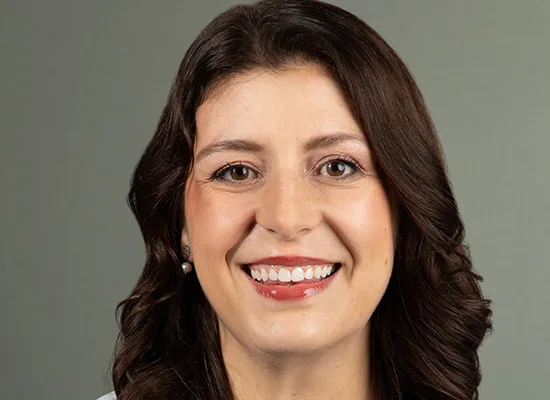
“My hope is that what I bring to DSCC… are the data points that help to drive advocacy and improvements in care.”
Dr. Sarah Sobotka first started working with the Division of Specialized Care for Children (DSCC) through her research to improve support for children with mechanical ventilators and their families.
“I have been working with DSCC as a critical partner in my research program since 2017,” she said, noting how DSCC helped recruit eligible families for her research studies.
“I am so fortunate to have had the enthusiastic support from DSCC because our missions are so aligned and from a research standpoint, it allows me to work with a state agency that lacks the bias of a single hospital center or a single institution… it is a more balanced sample, working with the entire state.”
Sobotka and DSCC share the same goal to better understand the needs of children with medical complexity and connect their families with the right services and support to achieve their best quality of life.
In 2020, DSCC’s leadership invited Sobotka to join our Medical Advisory Board as an expert medical provider.
Her research and expertise provide valuable perspectives on how to best allocate resources and improve systems of care for all Illinois children and youth with special healthcare needs.
An early focus on children with medical complexity leaving the hospital
Sobotka is an Associate Professor of Pediatrics, Section of Developmental and Behavioral Pediatrics, and Ambulatory Medical Director of Comer Developmental and Behavioral Pediatric Programs in the Department of Pediatrics at the University of Chicago.
She became interested in children with medical complexity while completing her residency.
“I did my pediatric residency, and then I elected to do a developmental and behavioral pediatric fellowship in order to focus on the diagnosis and support of children with disabilities and their families,” Sobotka said.
She quickly saw how long children with medical complexity and undiagnosed disability spent in the hospital.
“I recognized early on that an impediment to their flourishing and to their families’ functioning was the length of time they were in the hospital,” she said. “So, some of my early work focused on that process of discharge and the many components that have to get together in order for a child with medical complexity, particularly kids with ventilators, to leave the hospital.”
As part of Dr. Sobotka’s training, she took an additional year between her third and fourth year of medical school to complete a Master of Science for Clinical Professionals. This advanced degree gave her training in epidemiology and research.
Sobotka’s research focus has explored what happens after children with complex medical needs leave the hospital, what the home nursing landscape looks like and what individual families’ experiences and needs are.
One of Dr. Sobotka’s first research studies involved interviewing DSCC Care Coordinators, skilled private duty nurses, and parents of children in the Home Care Program who came home with a ventilator.
“I interviewed those parents a couple of times after going home, so I really started to understand the complexity of home care challenges and what that looked like for families,” she said.
This research project identified gaps in therapy services for these children, and Sobotka developed interventions to support their diverse disabilities. She also learned more about how DSCC Care Coordinators support families and what motivates and challenges professionals in this important role.
Improving the healthcare system’s efficiency
Over the last seven years, Sobotka has continued to partner with DSCC on multiple studies. Recent projects include:
- “Disparities in Home Nursing and Hospital Length of Stay for Children with Invasive Mechanical Ventilation: Identifying National Trends and Piloting a Parent-to-Parent Intervention”
- This study includes a parent-to-parent coaching pilot program for families. This pilot program is for families who have a child on a ventilator in the hospital and are awaiting home nursing so their child can be discharged home or have gone home and do not have enough home nursing support.
- This study includes a parent-to-parent coaching pilot program for families. This pilot program is for families who have a child on a ventilator in the hospital and are awaiting home nursing so their child can be discharged home or have gone home and do not have enough home nursing support.
- “Let’s E.A.T! (Eating with Assistive Technology)”
- This study aims to help children with feeding tubes and tracheostomies (trachs) eat by mouth. It is for families who have a child under 3 years old with a feeding tube and trach.
You can read more about these studies on pages 35 and 36 of our FY 2024 Annual Report.
A major theme in Sobotka’s work is improving the healthcare system’s efficiency so that all children, especially those with medical complexity, spend more time in the least restrictive environment at home with their families.
“This ultimately has the greatest potential to improve their developmental trajectory, because although this is a population at high risk for complex disability, I still believe there are opportunities to mitigate the worst disability outcomes with the right interventions at the right times,” Sobotka said.
Sobotka says families’ experiences and feedback direct the course of her research.
As a Medical Advisory Board member, Sobotka enjoys the opportunity to collaborate with other members to advocate for parent caregivers. She also aims to keep families’ needs and priorities at the center of decisions and improvements in the healthcare system.
“My hope is that what I bring to DSCC and also to other investigators, clinicians, and families are the data points that help to drive advocacy and improvements in care,” she said.
Thank you, Dr. Sobotka, for your dedication to improving the lives of children with complex medical needs and their families!
NurseNet Simplifies the Search for In-Home Nursing
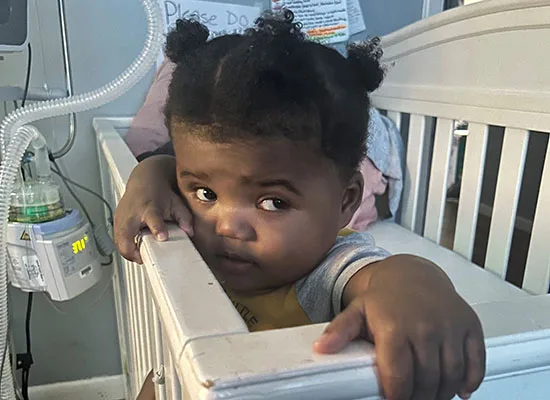
Home Care Program parent praises NurseNet as an easy way to find available nurses in your area
The search for in-home nurses can be exhausting for many families of loved ones with complex medical needs.
Home Care Program parent Shekia Wright understands this challenge.
She recently tried NurseNet to find available nurses for her 1-year-old son, Kaharri Pittman (pictured above). He has a tracheostomy and relies on a ventilator to breathe.
Shekia set up a NurseNet account and entered Kaharri’s nursing needs.
She quickly found two available matches from two different nursing agencies. Overall, she was impressed with how easy NurseNet is to use.
“It was easy to set up the account and easy to find available nurses,” Shekia said. “I would recommend NurseNet to any families looking for nursing.”
NurseNet is a new tool that makes it easier for families to find the in-home nursing care their child needs. We created NurseNet to be an online resource that connects families with available in-home nursing providers throughout Illinois.
Families can use NurseNet to share their nursing needs. Nursing agencies that are enrolled with the Division of Specialized Care for Children (DSCC) can see this information and contact families if they have available nurses who match the child’s care needs.
Nursing agencies can also use NurseNet to share information about where nurses are available.
This information can help families find suitable nursing care. It can also help nursing agencies identify opportunities to serve families.
How NurseNet Helps Families
- Easy Access: NurseNet is available 24/7, giving you the flexibility to search for nursing providers at your convenience.
- Comprehensive Listings: The tool includes a wide range of in-home nursing providers across the state, ensuring you have multiple options to choose from.
- Direct Connection: You can contact nursing providers directly through NurseNet, making the process of securing care for your child quicker and more straightforward.
How to Get Started
We encourage you to visit our NurseNet page and explore this new tool. There you’ll find guides and how-to videos to help you get started.
If you have problems accessing NurseNet, please send an email to dsccexternalhelp@uic.edu.
You can also talk to your DSCC Care Coordinator to help you get started. Your Care Coordinator can assist with the sign-up process during your next home visit.
We understand how important it is to have reliable, skilled nursing care for your child. We believe NurseNet will significantly improve your ability to find the support you need!
Podcast Highlights DSCC’s Role in Policy Solutions for Children with Complex Care Needs During Emergencies

The MCH Bridges podcast shares the story of how DSCC partnered with parent advocates and state agencies to allow generators to be an MFTD waiver benefit
In August 2020, a powerful windstorm called a derecho struck Illinois.
The storm produced about 15 tornadoes in the Chicagoland area and caused widespread power outages. Many people were without power for multiple days.
After the storm, parent advocate Susan Agrawal compiled feedback from Home Care Program families about how the power loss affected their children and loved ones with complex medical needs. She then shared this feedback with the Division of Specialized Care for Children (DSCC).
DSCC operates the Home Care Program on behalf of the Illinois Department of Healthcare and Family Services (HFS). The Home Care Program serves individuals who need in-home nursing to safely live at home.
Many of these individuals are enrolled in the Medicaid Home and Community-Based Services Waiver for Those Who Are Medically Fragile and Technology Dependent (MFTD waiver). These individuals often have tracheostomies, ventilators, gastrostomy tubes and other medical technology that depends on electricity.
The feedback Agrawal shared showed that many Home Care families wanted the ability to use MFTD waiver funds to pay for power generators for their homes.
DSCC took this feedback, did research and worked with HFS to pursue an amendment to the MFTD waiver to allow waiver funds to cover the cost of generators.
A recent episode of the MCH Bridges podcast tells the story of how this new waiver benefit became available for families. The podcast is from the Association of Maternal and Child Health Programs (AMCHP).
Dr. Molly Hofmann, DSCC’s Director of Care Coordination, Systems Development and Education, co-hosted the episode called “Generating Policy Solutions to Protect Children with Complex Health Care Needs During Emergencies.”
The episode highlights the importance of preparedness, especially in the face of natural disasters or power outages that can severely affect the care of children who are medically fragile and technology dependent.
It features the following DSCC team members and partners:
- Stephanie Leach, DSCC’s Associate Director of Systems of Care
- Courtney Kerfoot, DSCC’s Integrated Program Support Specialist
- Susan Agrawal, parent advocate, Director of the Family-to-Family Health Information Center at The Arc of Illinois and the founder and leader of MFTD Waiver Families in Illinois
- Pam Winsel of the Illinois Department of Healthcare and Family Services
Thank you to AMCHP for highlighting our efforts and partnerships to ensure children with complex medical needs have the life-saving technology they need in emergency situations!
You can learn more about how the MFTD waiver pays for home generators and other important benefits for Home Care families on our Waiver Services for Home Care Families page.
In-Depth Simulated Training in Chicago for Families and Caregivers of Children with Complex Medical Needs
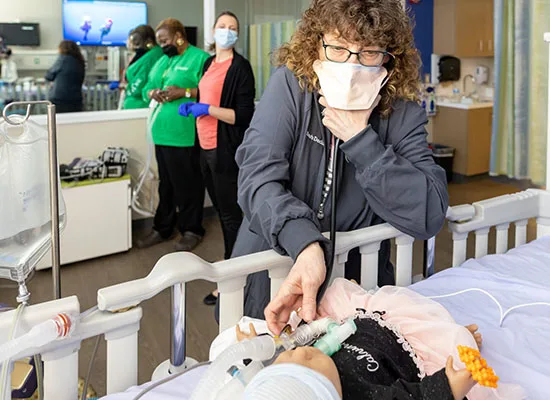
This free in-person training will take place Sept. 24-25 at UIC’s Simulation and Integrative Learning Center in Chicago.
Registration is now open for a special in-person training program for the families and caregivers of children with complex medical needs.
This free two-day training will take place Tuesday, Sept. 24, and Wednesday, Sept. 25, at the University of Illinois Chicago Simulation and Integrative Learning (SAIL) Center on the fifth floor at 1220 S. Wood St. in Chicago.
Families have shared the need for more support for parents/caregivers of children with complex medical needs. We are excited to partner with Almost Home Kids to provide this valuable training opportunity. It will offer essential tools and knowledge to help you in your caregiving journey.
You may attend this training if you:
- Are the parent or caregiver of a child in the Home and Community-Based Services Waiver for Those Who Are Medically Fragile Technology Dependent (MFTD waiver)
- Have prior experience in caring for a child with a tracheostomy (trach) tube and/or a child with a trach tube and ventilator
- Are able to commit to online learning before the in-person learning days
- Can attend both dates to complete the training
The training will be from 8 a.m. to 4:30 p.m. each day. The in-depth curriculum will include:
- Reducing the risk of infection
- Skin care
- Daily care of the child with a tracheostomy and ventilator
- Activity and movement
- Equipment and alarms
- Gastrostomy care and feeding
- Tracheostomy basics
- Respiratory assessment and interventions
- Ventilator training with hands-on practice
- Emergency preparedness
- Caregiver resiliency and well-being
- Simulation learning experience
You can also see the Caregiver Simulated Training flyer for more details.
Please sign up online to participate in the training. There is no cost to attend.
For more information, contact Yolanda Rivera, Nursing Professional Development Specialist and Clinical Educator, at connect@almosthomekids.org or (630) 271-9155, ext. 114.
This training is part of our efforts to use federal funding from the American Rescue Plan Act to improve support and services for families of children with complex medical needs.
Almost Home Kids (AHK) provides a bridge from hospital to home through an innovative community-based care system for children with medical complexities. Its services include:
- Responding to the needs of families
- Training caregivers
- Advocating for accessibility and inclusion
- Educating healthcare professionals
Almost Home Kids has locations in Chicago, Naperville and Peoria.
In-Depth Training Opportunity in Chicago for Families and Caregivers of Children with Complex Medical Needs

This free in-person training will take place July 24-25 at UIC’s Simulation and Integrative Learning Center in Chicago.
Registration is now open for a special in-person training program for the families and caregivers of children with complex medical needs.
This free two-day training will take place Wednesday, July 24, through Thursday, July 25, at the University of Illinois Chicago Simulation and Integrative Learning (SAIL) Center on the fifth floor at 1220 S. Wood St. in Chicago.
Families have expressed the need for more support for parents/caregivers of children with complex medical needs. We are excited to partner with Almost Home Kids to provide this valuable training opportunity. It will offer essential tools and knowledge to help you in your caregiving journey.
The training will be from 8 a.m. to 4:30 p.m. each day. The in-depth curriculum will include:
- Reducing the risk of infection
- Skin care
- Daily care of the child with a tracheostomy and ventilator
- Activity and movement
- Equipment and alarms
- Gastrostomy care and feeding
- Tracheostomy basics
- Respiratory assessment and interventions
- Ventilator training with hands-on practice
- Emergency preparedness
- Caregiver resiliency and well-being
- Simulation learning experience
You can also see the Caregiver Simulated Training flyer for more details.
Please sign up online to participate in the training. There is no cost to attend.
For more information, email connect@almosthomekids.org or contact Yolanda Rivera at yrivera@luriechildrens.org.
This training is part of our efforts to use federal funding from the American Rescue Plan Act to improve support and services for families of children with complex medical needs.
Almost Home Kids (AHK) provides a bridge from hospital to home through an innovative community-based care system for children with medical complexities. Its services include:
- Responding to the needs of families
- Training caregivers
- Advocating for accessibility and inclusion
- Educating healthcare professionals
Almost Home Kids has locations in Chicago, Naperville and Peoria.
DSCC Creates New Tool to Improve Families’ Access to Available In-Home Nursing
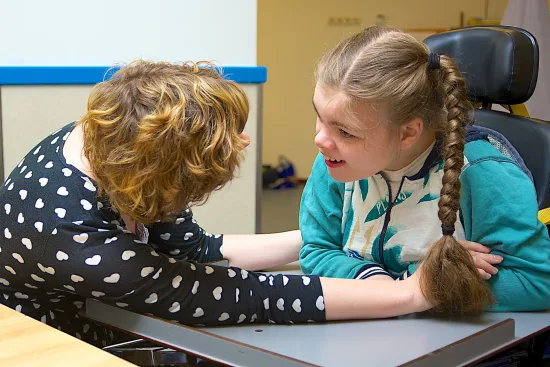
NurseNet helps Home Care Program families connect with nursing agencies to find available nurses in your area.
Finding in-home nurses can be challenging for many families caring for children and adults with complex medical needs.
We’ve created a new tool to help you find and connect with available nursing agencies in your area.
NurseNet aims to bridge the gap between Illinois families who need nursing and home health nursing agencies with available nurses.
Families of individuals enrolled in the Home Care Program can use NurseNet to share their nursing needs. Nursing agencies that are enrolled with the Division of Specialized Care for Children (DSCC) can share information about where nurses are available.
This information can help your family find suitable nursing care. It can also help nursing agencies identify opportunities to serve families.
Anyone can use NurseNet to search for general nursing opportunities across the state.
The search is set up for families and nursing agencies to find and share what they need easily. As a family enrolled in the Home Care Program, you can log in to NurseNet and enter your nursing needs.
Nursing agencies can see this information and contact your family within NurseNet if they have a potential nursing opportunity in your area that matches your child’s care needs. You can also use NurseNet to see where nursing opportunities are available throughout Illinois.
Nursing agencies enrolled with DSCC can log in to NurseNet and enter all areas of the state where they have nurses available. Nursing agencies can also see where families have nursing needs and connect with those families to provide nursing care.
Visit the NurseNet page on our website to learn about how NurseNet can help both families and nursing agencies. You can also find helpful videos and guides on how to use NurseNet.
We understand the search for in-home nursing can be frustrating and overwhelming. That’s why we created this tool to help you share your nursing needs and connect with nursing agencies with available nurses.
We are excited to offer this tool to help provide nursing connections to our participant families enrolled in the Home Care Program!
Meet Our Medical Advisory Board Member Dr. Carolyn Foster
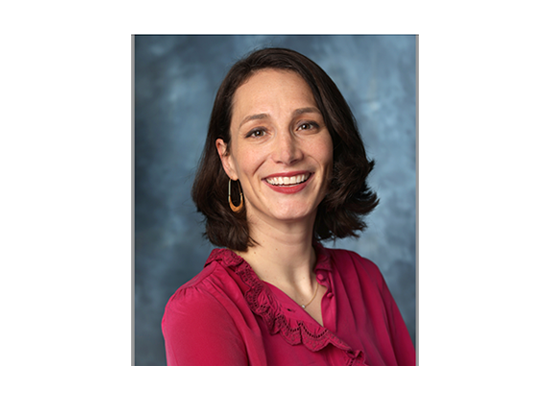
“I want to improve the delivery of care to kids and families who have the most significant medical needs.”
Dr. Carolyn Foster is a physician and researcher who has dedicated her career to improving the care and quality of life for children with complex medical needs and their families.
Therefore, serving on the Medical Advisory Board (MAB) for the Division of Specialized Care for Children (DSCC) was a natural fit.
Foster joined the board in 2020. She brings her perspective as a provider as well as 15-plus years of research focused on home health care for children with complex medical needs.
“I was acutely aware from my own patients of the role DSCC played in helping them,” Foster said. “I felt I could bring my experiences as a health services researcher and my understanding of how we evaluate healthcare services and what we know about kids with complex medical needs.”
Foster is currently an attending physician at Ann and Robert H. Lurie Children’s Hospital of Chicago in advanced general pediatrics and primary care. She is also an assistant professor of pediatrics at Northwestern University Feinberg School of Medicine.
Her research centers on developing and evaluating healthcare delivery interventions and healthcare policies for children with medical complexity and disability. The purpose is to maximize health outcomes for these children and improve how well their family members and caregivers navigate their systems of care.
Foster is particularly interested in improving both the access to and the quality of home and community- based health care for children to help them live safe, independent and full lives at home, school and beyond.
“I had a family member who had a health condition that impacted her experience in the day-to-day world, and it motivated me to be a physician. When I was in training, I appreciated this tool of using health services research to improve how we deliver care,” she said.
“I want to improve the delivery of care to kids and families who have the most significant medical needs. There is an ongoing gap in how we serve that population, so I want to put my effort there… This patient population deserves a voice, and I’m hoping to further emphasize that.”
Foster said she appreciates DSCC’s work to shed light on these issues statewide. She is happy to help advise and cheer on these efforts.
“Having a child who has a special healthcare need or disability or complex medical problem is really challenging because the health care, education and community resources are not always talking to one another,” she said.
“DSCC is one of those key programs in the state of Illinois that really provides an important function in making it a little easier for families by helping with care coordination and getting what they need for their child.”
Learn more about Foster’s latest research study below:
What Happens When Caregivers Get Sick? Preparations During COVID-19 and Beyond
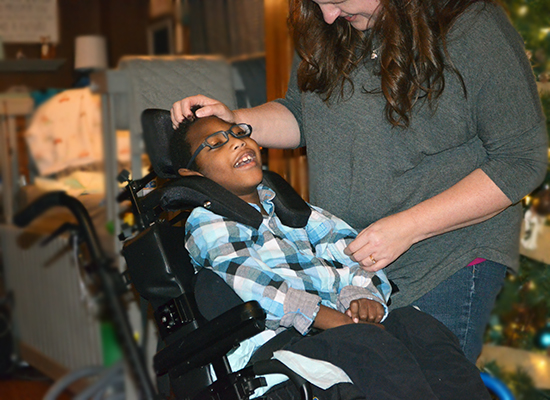
Tips to help parents of children with medical complexity prepare for their own illness and other emergencies
Parents and caregivers of children with medical complexity often focus solely on their child’s health and wellbeing. But what happens when the parent/caregiver gets sick?
It’s a crucial question that families must consider.
“Self-care is overlooked by many parents because they’re so focused on day-to-day care for their child and thinking about what happens if the child becomes ill. Sometimes the daily care of their child can really overshadow parents caring for themselves and making contingency plans if they become ill,” said Dr. Alexandra Ryan, Medical Director for Ann and Robert H. Lurie Children’s Hospital of Chicago’s Health Partners Care Coordination.
“Especially in a climate like this where we have a pandemic, it’s even more important for families to think about what happens if a parent or caregiver is unable to do that daily care.”
Advance preparations can help parents/caregivers reduce stress, lighten their mental load and protect the child’s health and safety during a family illness and other emergencies.
“It’s simply disaster planning and something that all families of children with medical complexity should do on an ongoing basis,” said Dr. Carolyn Foster, Assistant Professor of Pediatrics at Lurie. “For many of these children, they can’t have just any babysitter or relative come over and learn it all in five minutes… The needs are so specific for these children, it requires additional planning.”
Drs. Foster and Ryan spoke with UIC’s Division of Specialized Care for Children (DSCC) about how to start these conversations with your pediatrician during the pandemic and beyond.
Assess your risk
It’s important to learn how to mitigate your family’s risk of contracting COVID-19. Dr. Foster says you can talk with your pediatrician about how to balance this risk with your child’s needs.
“For some children, going to school will be really important because of the way their therapies are set up or what their school’s plans are for in-person learning,” she said.
Lurie has put together a helpful guide, “Return to School for Youth with Special Healthcare Needs: Key Questions and Considerations for Families.”
It includes questions to discuss with your child’s doctor.
Pediatricians can recommend prevention strategies and what works for other families in similar situations.
The next step is preparing for what happens if you do get sick and stay ill for an extended period.
During these conversations, pediatricians may ask about your family’s living situation, including your home’s physical setup and who could isolate with you.
“This information can help with the decision-making and planning, although it’s not something everybody may be comfortable or ready to talk about with their pediatrician,” Dr. Foster said. “In this case, it’s very relevant.”
Have an up-to-date care plan
One of the most important steps for parents of children with medical complexity in general is to make sure your child has an up-to-date care plan.
The care plan should include a description of your child’s major medical issues, a complete medication list, an overview of their daily routine, a list of their healthcare providers and a plan for what happens if your child becomes ill. (The National Resource Center for Patient/Family-Centered Medical Home provides numerous tools, templates and more to help build a care plan.)
You should also keep an inventory of your child’s necessary medical supplies and have a backup supply, when possible, in case you need to quarantine. (DSCC also provides guidance for how to safely clean and reuse home medical supplies.)
“Having that information available makes it easier for whoever needs to take over care for the child in an emergency,” Dr. Foster said. “So, starting to develop the care plan if they don’t have one already is very important.”
Choosing backup caregivers
The care plan should also identify appropriate backup options if you or the primary caregiver cannot care for your child. These options could include family members, friends, a respite or transitional-care facility, or the hospital.
It’s important to consider who is best suited to provide backup care and make sure these individuals are aware and willing to help.
“Something for parents to keep in mind as they are thinking about backup care is trust. It’s more important that parents trust this person with the medical care and that the child can also develop trust in this person, whether it’s your closest family member or not,” Dr. Ryan said. “It’s more important to think about the characteristics of the person and how much trust you have in that person’s ability to do the tasks for the child, rather than the relationship.”
Dr. Foster recommends letting the backup caregiver spend time with your child and practice administering medication, watch how to safely transfer them and so on.
“It reduces the stress for the person who has to step in so it’s not all new to them,” she said.
If a family member or friend is not available, Drs. Foster and Ryan suggest looking to your family’s faith or school community. You should also let your pediatrician know if you’re struggling to identify backup care.
Preparing for hospitalization
Depending on their medical complexity, some children may require hospitalization if their parent/caregiver becomes ill. Discuss this possibility with your pediatrician and identify your hospital preference and transportation needs.
Dr. Foster said pediatricians can help you find the least restrictive option available for your child, such as a long-term care or respite facility.
If hospitalization or a facility stay is necessary, write down any “need to knows” about your child and keep them with their care plan and medication list.
Dr. Ryan said it’s helpful to include information about your child’s baseline development and behavior, such as how they typically communicate, how your child looks when healthy, etc.
“So often if somebody is hospitalized, especially patients with mental disabilities or medical complexity, the patient team may not know what the child looks like when they’re healthy. If you don’t know the child, it can be really hard to tell if they’re sick,” Dr. Ryan said. “Making sure that’s something that’s communicated to everyone taking care of the child is really important.”
Dr. Foster said it’s also good to have a list of important phone numbers at the ready. These contacts should include any specific transportation needed to get your child to the hospital.
“If there are any specific transportation arrangements that the caregiver should know about, that should be part of the care plan,” she said.
Home nursing
Some children with medically complexity who have nursing in the home setting may be able to continue to stay at home but with extra nursing care, if the child’s primary caregiver is ill or incapacitated.
Illinois’ Medicaid Program has worked to ensure additional respite hours are available for children who receive services from a Medicaid waiver.
Let your nursing agency know in advance if you prefer this option for your child.
Plan for future guardianship needs
Parents/caregivers should always make sure they have a will in place. A will ensures your future guardianship needs and other important decisions are planned for accordingly.
“We all know, especially in today’s world, how quickly things can change, so it’s really important to put planning a will more on the front burner for any family, but especially if you have a child with medical complexity who is going to require specialized care,” Dr. Ryan said.
“If a family has gone through the mental exercise of figuring out who they trust and who they’d like to take care of their child in case they get sick, then who they’d like to care for their child in the long-term if something happens to them may be the same person,” she added. “It may not be someone who guardianship automatically goes to, so that’s why it’s so important to have something in writing going forward.”
Lurie and DSCC staff recommend the following resources:
- Greenlight Family Services – Formally known as the Center for Law and Social Work, Greenlight helps families all over Illinois with adult guardianship cases and can also counsel families on backup arrangements as well.
- Lurie’s Understanding Guardianship Tip Sheet – Available in English and Spanish
- Illinois Guardianship and Advocacy Commission
- The Guide to Special Needs Planning – Information on special needs trusts from the Academy of Special Needs Planners
- The Family Caregiver Alliance – Provides fact sheets on legal topics, including conservatorship and guardianship
- Family Voices resource e-blast – Includes tips for what to do if the caregiver gets sick/can’t care for their child
- Illinois Attorney General’s Office – Provides legal assistance referral information
- The National Hospice and Palliative Care Organization – Information on advance directives in Illinois
- The Conversation Project – Provides conversation starter kits to help families plan for their wishes regarding end-of-life care
Prioritize planning
Though these steps and conversations may require some additional effort, Drs. Foster and Ryan say they are well worth the time and peace of mind.
“I think there’s a lot of invisible stress that parents may not even realize they have on their mind,” Dr. Ryan said. “You can really tackle it by having a plan in case the worst happens. People will see a lightening of that mental load once they have a plan in place.”
Dr. Foster also notes that there is no one-size-fits-all approach to contingency planning.
“Like any family decision, yours might be slightly different than others,” she said. “It’s very individualized. I’ve heard parents worry about judgment or this is what others are doing, but it’s a personalized decision based on a family’s unique situation.”


